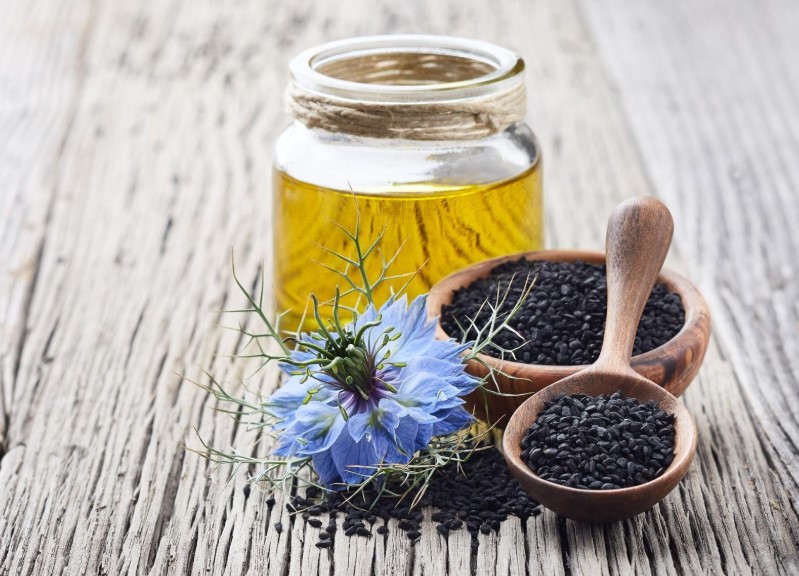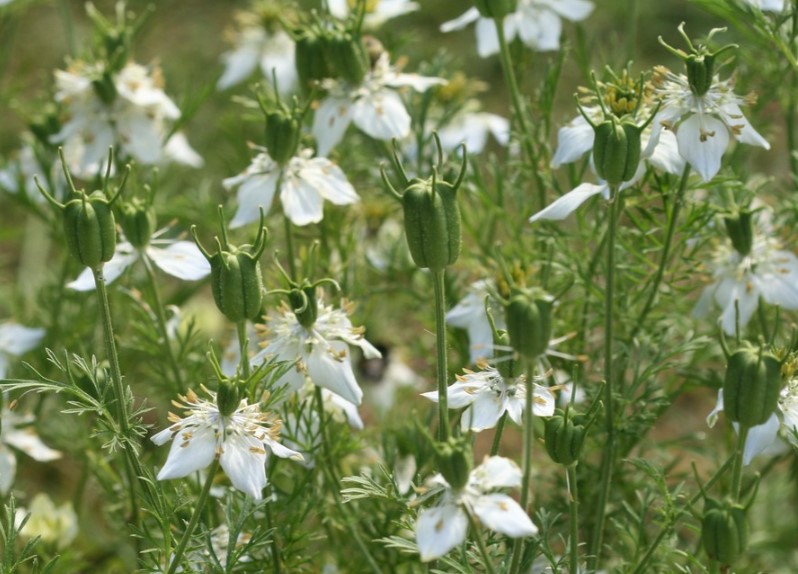
Black Cumin Seed Oil in Traditional Medicine
Black cumin seed oil, extracted from the seeds of Nigella sativa, has been a cornerstone of traditional medicine for thousands of years across various cultures. Revered as a “cure for all diseases except death” in ancient texts, this oil has been used to treat a wide range of ailments. Today, modern science is validating many of these historical claims, uncovering the mechanisms behind its therapeutic properties. This article explores the ancient uses of black cumin seed oil in traditional medicine and how contemporary research supports its efficacy.

Table of Contents
Ancient Uses in Traditional Medicine
1. Ancient Egypt
In ancient Egypt, black cumin seed oil was prized for its medicinal and cosmetic properties. Found in the tomb of Pharaoh Tutankhamun, it was used as a digestive aid, skin treatment, and preservative in mummification. Cleopatra reportedly applied it to maintain her radiant skin and lustrous hair, while physicians used it to treat colds, headaches, and infections.
2. Ayurvedic and Unani Medicine
In Ayurveda, practiced in India for over 3,000 years, black cumin seed oil, known as “kalonji oil,” was used to balance the body’s doshas (energies). It was prescribed for respiratory issues, digestive disorders, and to boost immunity. In Unani medicine, prevalent in Persian and Islamic cultures, the oil was a remedy for asthma, allergies, and joint pain, often administered orally or topically to reduce inflammation.
3. Middle Eastern and Islamic Traditions
The Prophet Muhammad is famously quoted as saying that black cumin seeds “heal every disease except death,” cementing its status in Islamic medicine. In the Middle East, it was used to treat fever, diabetes, and skin conditions like eczema. The oil was also ingested to enhance vitality and mixed with honey for respiratory ailments.
4. Traditional Chinese Medicine
In Chinese medicine, black cumin seed oil was less common but used in some regions to support liver and kidney function, promote detoxification, and alleviate pain. Its warming properties were believed to improve circulation and reduce stagnation in the body.
Key Traditional Applications
- Digestive Health: The oil was taken to relieve bloating, indigestion, and parasites, often mixed with warm water or herbs.
- Respiratory Support: Inhaled as steam or consumed, it treated coughs, asthma, and bronchitis.
- Skin and Hair Care: Applied topically, it soothed burns, wounds, and infections while nourishing skin and hair.
- Pain and Inflammation: Massaged into joints or muscles, it alleviated arthritis and soreness.
- Immune Boosting: Regular consumption was believed to strengthen the body’s defenses against infections.
Modern Scientific Validation
Recent research has begun to confirm many traditional uses of black cumin seed oil, attributing its benefits to bioactive compounds like thymoquinone, nigellone, and essential fatty acids. Below are key areas where science aligns with historical practices:
1. Anti-Inflammatory and Pain Relief
Traditional use for arthritis and muscle pain is supported by studies showing thymoquinone’s ability to inhibit pro-inflammatory cytokines. A 2016 study in Journal of Ethnopharmacology found that black cumin seed oil reduced joint inflammation in rheumatoid arthritis patients, validating its use for pain relief.
2. Antimicrobial Properties
Ancient cultures used the oil for infections and wounds. Modern studies, such as one in Phytotherapy Research (2010), confirm its antibacterial, antiviral, and antifungal effects against pathogens like Staphylococcus aureus and Candida albicans, explaining its efficacy in treating skin infections and boosting immunity.
3. Digestive Health
Its historical use for digestive issues is backed by research showing that black cumin seed oil reduces gastric inflammation and protects against ulcers. A 2011 study in World Journal of Gastroenterology demonstrated its ability to combat Helicobacter pylori, a bacteria linked to stomach ulcers.
4. Respiratory Health
Traditional steam inhalation for asthma and coughs aligns with studies indicating that black cumin seed oil relaxes bronchial muscles. A 2017 study in Phytomedicine showed improved lung function in asthma patients, supporting its use for respiratory conditions.
5. Skin and Hair Benefits
Cleopatra’s use for skin and hair is validated by the oil’s moisturizing fatty acids and antioxidants, which combat acne, eczema, and hair loss. A 2014 study in Journal of Dermatology & Dermatologic Surgery found it reduced acne severity, while its nutrients strengthen hair follicles.
6. Immune Support
The oil’s traditional role in immunity is supported by a 2016 study in Immunological Investigations, which showed enhanced T-cell and natural killer cell activity, improving resistance to infections.
Practical Modern Uses
To incorporate black cumin seed oil, inspired by traditional methods:
- Oral Consumption: Take 1–2 teaspoons daily (mixed with honey or juice) for immunity, digestion, or inflammation. Start with ½ teaspoon to assess tolerance.
- Topical Application: Dilute 2–3 drops with a carrier oil (e.g., jojoba) for skin conditions, joint pain, or hair growth. Apply 1–2 times daily.
- Inhalation: Add a few drops to hot water and inhale steam for respiratory relief.
- Dietary Addition: Drizzle 1 teaspoon over salads or soups to support overall health, avoiding high heat.
Precautions
- Dosage: Adhere to 1–2 teaspoons daily orally; excess may cause digestive upset or lower blood pressure.
- Allergies: Test on skin or start with a small oral dose to check for reactions.
- Medical Conditions: Consult a doctor if pregnant, breastfeeding, or on medications, as it may affect blood sugar, pressure, or clotting.
- Quality: Use cold-pressed, organic oil from reputable sources.
Black cumin seed oil’s enduring role in traditional medicine reflects its versatility, from ancient Egypt to Ayurvedic practices. Modern science validates its anti-inflammatory, antimicrobial, and immune-boosting properties, confirming its efficacy for digestion, respiratory health, skin, and pain relief. By blending historical wisdom with evidence-based use, this oil remains a powerful natural remedy. Use it mindfully, respecting dosage and consulting professionals, to harness its benefits safely and effectively.




